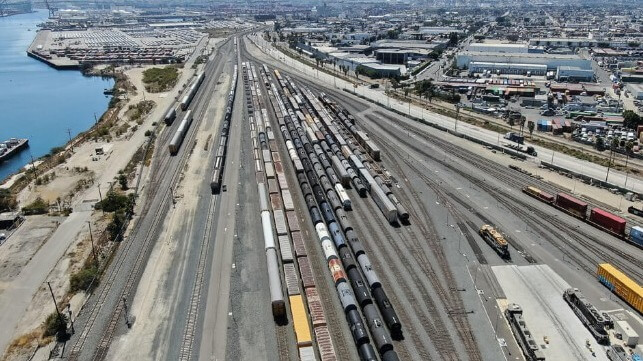Congress Prevents Railroad Strike that Would Disrupt Ports and Freight

The U.S. Senate passed legislation previously approved by the House and sent it to President Biden to impose a settlement blocking a potential railroad strike. The U.S. had been facing the threat of a devastating railroad strike expected to start on December 9 that would have caused new disruptions across the supply chain just as U.S. ports are recovering from their massive backlogs.
The White House had stepped into the labor negotiations in September leading a marathon bargaining session as a 60-day cooling-off period was due to expire. The 11-hour session resulted in a contract agreement that calls for a 24 percent pay increase for the unionized railroad workers. Estimated had been that if the 115,000 railroad workers nationwide walked off the job it would cost the U.S. economy as much as $2 billion per day. It would have impacted the movement of containers through America’s ports and vital supplies of food as well as consumer goods.
Four out of the 12 unions covered by the agreement however had rejected the contract raising the prospect of the December strike. The key sticking point had remained paid sick leave for the workers and an issue Democratic lawmakers strongly support. The unions contend the railroads use a system that prevents workers from taking sick days.
When it became apparent that a strike was looming, President Biden turned to a 1926 law that permits the U.S. Congress to intervene when disputes between the unions and carriers threaten commerce. Congress has the authority to impose either a cooling-off period delaying strikes or a settlement. Under the law, any worker who proceeded to strike after the congressional would be fired and possibly face prosecution.
The U.S. House of Representatives took up the legislation on Monday passing it by a vote of 290 to 137 to impose a tentative contract deal that had been reached in September. Separately, they voted 221 to 207 to add seven days of paid sick leave to the contract for railroad workers.
The Senate followed suit on Wednesday passing the bill to impose the settlement by a vote of 80 to 15, with one senator (Rand Paul of Kentucky) voting present. The bill passed after an alternative had been presented to instead impose a new cooling-off period into 2023. In a more heated debate, the Senate voted 52 to 43 to add the sick leave guarantee to the contract. However, the Senate rules required a super-majority for the amendment to pass meaning it will not be included in the final settlement.
“This week’s bipartisan action pulls our economy back from the brink of a devastating shutdown that would have hurt millions of families and union workers in countless industries,” said President Biden after the Senate vote. “Working together, we have spared this country a Christmas catastrophe in our grocery stores, in our workplaces, and in our communities.”
Imposing the settlement was a difficult decision for the White House and Congress because of the Democrats' strong support for unions but they determined the alternative of a strike was not acceptable. The administration is highlighting the 24 percent pay increase, improvement in overall health benefits, and preserving two-person crews on trains, saying it is a strong contract for the workers while vowing to continue to advocate for paid sick leave for workers in all industries.

that matters most
Get the latest maritime news delivered to your inbox daily.
Union leaders criticized the actions still calling for the addition of sick leave. They contend it is a basic right that the carriers could afford especially while they are currently making strong profits from the surge in freight and signs consumer spending is holding up despite fears over the broader economy.
The Association of American Railroads, which represents the nation’s freight rail companies, praised the congressional action. They tanked the President and Congress for “averting an economically devastating rail work stoppage.”
